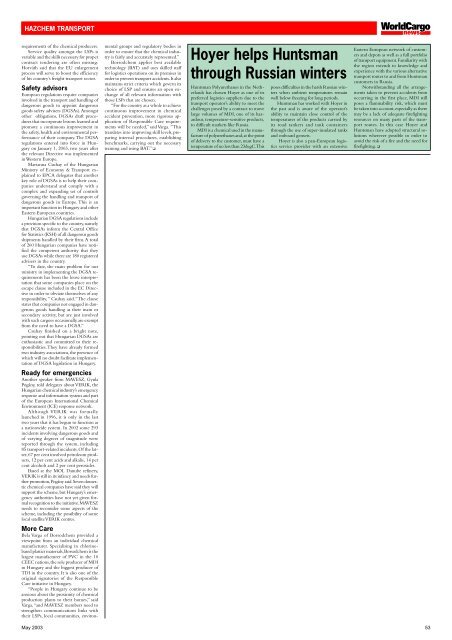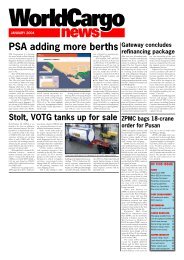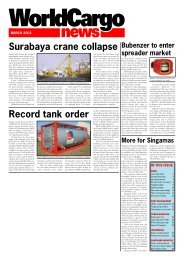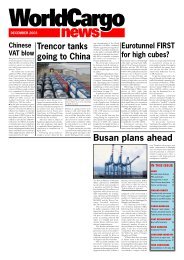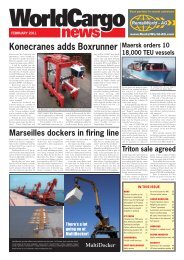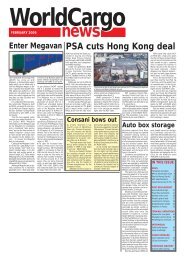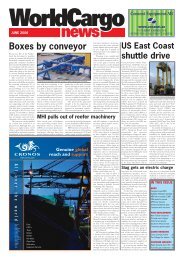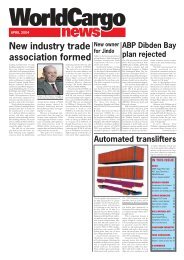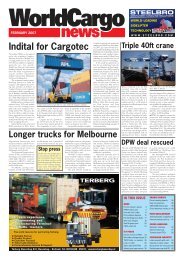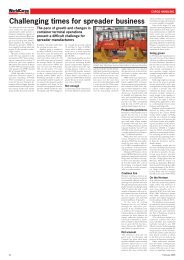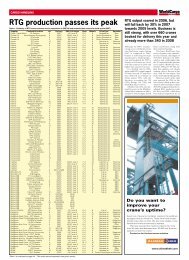Front Cover May - WorldCargo News Online
Front Cover May - WorldCargo News Online
Front Cover May - WorldCargo News Online
Create successful ePaper yourself
Turn your PDF publications into a flip-book with our unique Google optimized e-Paper software.
HAZCHEM TRANSPORT<br />
<strong>WorldCargo</strong><br />
news<br />
requirements of the chemical producers.<br />
Service quality amongst the LSPs is<br />
variable and the skills necessary for proper<br />
contract tendering are often missing.<br />
Horváth said that the EU enlargement<br />
process will serve to boost the efficiency<br />
of his country’s freight transport sector.<br />
Safety advisors<br />
European regulations require companies<br />
involved in the transport and handling of<br />
dangerous goods to appoint dangerous<br />
goods safety advisers (DGSAs). Amongst<br />
other obligations, DGSAs draft procedures<br />
that incorporate lessons learned and<br />
promote a continuous improvement in<br />
the safety, health and environmental performance<br />
of their company. The DGSA<br />
regulations entered into force in Hungary<br />
on January 1, 2003, two years after<br />
the relevant Directive was implemented<br />
in Western Europe.<br />
Marianna Csuhay of the Hungarian<br />
Ministry of Economy & Transport explained<br />
to EPCA delegates that another<br />
key role of DGSAs is to help their companies<br />
understand and comply with a<br />
complex and expanding set of controls<br />
governing the handling and transport of<br />
dangerous goods in Europe. This is an<br />
important function in Hungary and other<br />
Eastern European countries.<br />
Hungarian DGSA regulations include<br />
a provision specific to the country, namely<br />
that DGSAs inform the Central Office<br />
for Statistics (KSH) of all dangerous goods<br />
shipments handled by their firm. A total<br />
of 260 Hungarian companies have notified<br />
the competent authority that they<br />
use DGSAs while there are 180 registered<br />
advisers in the country.<br />
“To date, the main problem for our<br />
ministry in implementing the DGSA requirements<br />
has been the loose interpretation<br />
that some companies place on the<br />
escape clause included in the EC Directive<br />
in order to obviate themselves of any<br />
responsibility, ” Csuhay said. “The clause<br />
states that companies not engaged in dangerous<br />
goods handling as their main or<br />
secondary activity, but are just involved<br />
with such cargoes occasionally, are exempt<br />
from the need to have a DGSA.”<br />
Csuhay finished on a bright note,<br />
pointing out that Hungarian DGSAs are<br />
enthusiastic and committed to their responsibilities.<br />
They have already formed<br />
two industry associations, the presence of<br />
which will no doubt facilitate implementation<br />
of DGSA legislation in Hungary.<br />
mental groups and regulatory bodies in<br />
order to ensure that the chemical industry<br />
is fairly and accurately represented.”<br />
Borsodchem applies best available<br />
technology (BAT) and uses skilled staff<br />
for logistics operations on its premises in<br />
order to prevent transport accidents. It also<br />
maintains strict criteria which govern its<br />
choice of LSP and ensures an open exchange<br />
of all relevant information with<br />
those LSPs that are chosen.<br />
“For the country as a whole to achieve<br />
continuous improvement in chemical<br />
accident prevention, more rigorous application<br />
of Responsible Care requirements<br />
will be needed,” said Varga. ”This<br />
translates into improving skill levels, preparing<br />
internal procedures, establishing<br />
benchmarks, carrying out the necessary<br />
training and using BAT.” ❏<br />
Hoyer helps Huntsman<br />
through Russian winters<br />
Huntsman Polyurethanes in the Netherlands<br />
has chosen Hoyer as one of its<br />
preferred logistics suppliers due to the<br />
transport operator’s ability to meet the<br />
challenges posed by a contract to move<br />
large volumes of MDI, one of its hazardous,<br />
temperature-sensitive products,<br />
to difficult markets like Russia.<br />
MDI is a chemical used in the manufacture<br />
of polyurethanes and, at the point<br />
of delivery to the customer, must have a<br />
temperature of no less than 23degC. This<br />
poses difficulties in the harsh Russian winters<br />
when ambient temperatures remain<br />
well below freezing for long periods.<br />
Huntsman has worked with Hoyer in<br />
the past and is aware of the operator’s<br />
ability to maintain close control of the<br />
temperatures of the products carried by<br />
its road tankers and tank containers<br />
through the use of super-insulated tanks<br />
and onboard gensets.<br />
Hoyer is also a pan-European logistics<br />
service provider with an extensive<br />
Eastern European network of customers<br />
and depots as well as a full portfolio<br />
of transport equipment. Familiarity with<br />
the region extends to knowledge and<br />
experience with the various alternative<br />
transport routes to and from Huntsman<br />
customers in Russia.<br />
Notwithstanding all the arrangements<br />
taken to prevent accidents from<br />
occurring in the first place, MDI still<br />
poses a flammability risk, which must<br />
be taken into account, especially as there<br />
may be a lack of adequate firefighting<br />
resources on many parts of the transport<br />
routes. In this case Hoyer and<br />
Huntsman have adopted structural solutions<br />
wherever possible in order to<br />
avoid the risk of a fire and the need for<br />
firefighting. ❏<br />
Ready for emergencies<br />
Another speaker from MAVESZ, Gyula<br />
Pogány, told delegates about VERIK, the<br />
Hungarian chemical industry’s emergency<br />
response and information system and part<br />
of the European International Chemical<br />
Environment (ICE) response network.<br />
Although VERIK was formally<br />
launched in 1996, it is only in the last<br />
two years that it has begun to function as<br />
a nationwide system. In 2002 some 293<br />
incidents involving dangerous goods and<br />
of varying degrees of magnitude were<br />
reported through the system, including<br />
85 transport-related incidents. Of the latter,<br />
67 per cent involved petroleum products,<br />
12 per cent acids and alkalis, 14 per<br />
cent alcohols and 2 per cent peroxides.<br />
Based at the MOL Danube refinery,<br />
VERIK is still in its infancy and needs further<br />
promotion, Pogány said. Seven domestic<br />
chemical companies have said they will<br />
support the scheme, but Hungary’s emergency<br />
authorities have not yet given formal<br />
recognition to the initiative. MAVESZ<br />
needs to reconsider some aspects of the<br />
scheme, including the possibility of some<br />
local satellite VERIK centres.<br />
More Care<br />
Bela Varga of Borsodchem provided a<br />
viewpoint from an individual chemical<br />
manufacturer. Specialising in chlorinebased<br />
plastics materials, Borsodchem is the<br />
largest manufacturer of PVC in the 10<br />
CEEC nations, the sole producer of MDI<br />
in Hungary and the biggest producer of<br />
TDI in the country. It is also one of the<br />
original signatories of the Responsible<br />
Care initiative in Hungary.<br />
“People in Hungary continue to be<br />
anxious about the proximity of chemical<br />
production plants to their homes,” said<br />
Varga, “and MAVESZ members need to<br />
strengthen communications links with<br />
their LSPs, local communities, environ-<br />
<strong>May</strong> 2003 53


